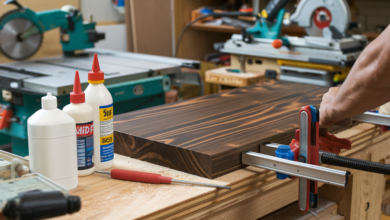Tips for Setting Up a Small Space Woodworking Workshop
Setting up a woodworking workshop in a small space can be a rewarding challenge. With careful planning and smart organization, even a compact area can become a fully functional workshop. Whether you’re working out of a garage, a basement, or a spare room, there are a variety of ways to optimize your layout and make the most of limited space.
This guide will cover everything from choosing the right tools and storage solutions to setting up safe and efficient work areas.
Assessing Your Space and Planning Your Layout
Before buying equipment or rearranging your tools, take time to assess the area you have. Measure the dimensions of the space, including the height, width, and length, and consider any obstructions like windows, doors, or support beams.

Consider if there are areas that could double as storage or work surfaces, such as under shelves or above workbenches.
Planning Tips:
- Identify Workflow Zones: In a woodworking workshop, tasks often fall into different categories: cutting, assembly, finishing, and storage. Think of ways to establish zones in your small space where each task can occur without too much overlap.
- Consider Lighting and Power Outlets: Natural light can be a great asset, but make sure you have ample artificial light to avoid shadows and enhance accuracy. Also, ensure you have enough power outlets in the right places to avoid messy extension cords.
- Use Vertical Space: In small spaces, vertical storage and organization are crucial. Plan to use wall-mounted storage options, pegboards, and overhead shelving to maximize available space.
- Leave Room to Move: It’s tempting to fill a small space with every tool imaginable, but leaving room to move is essential. Ensure you can safely navigate your workspace without tripping or bumping into tools.
Choosing Essential Tools and Equipment
In a small workshop, choosing the right tools is key. Look for compact and multi-functional tools that save space but still allow you to complete a wide range of tasks. Here’s a list of tools that work well in small woodworking shops:
1. Table Saw Alternatives
In tight spaces, a full-sized table saw may be unrealistic. Consider a compact or portable table saw, or a circular saw combined with a cutting guide for accurate cuts. Track saws are also highly portable and can offer precision close to that of a table saw.
2. Workbench
Your workbench is the heart of the workshop. Look for a sturdy workbench that fits your space without crowding it. Folding workbenches can be great for small spaces since they can be put away when not in use. Alternatively, consider a wall-mounted workbench that folds down when needed and saves floor space.
3. Drill and Impact Driver
A good cordless drill and an impact driver are essential for nearly every woodworking project. Choose models with sufficient power for your typical projects but compact enough to be stored easily. Wall-mounted chargers can keep batteries ready while saving bench space.
4. Miter Saw
A compact miter saw is great for cutting angles and crosscuts. Some models come with built-in dust collection and smaller footprints, making them ideal for limited spaces. Miter saw stands with folding arms can offer additional stability and then fold away for easy storage.
5. Hand Tools
Hand tools like chisels, hand planes, and rasps are versatile and don’t take up much space. They are also quieter and cleaner than power tools, making them ideal for small or shared spaces. Store them on a wall-mounted tool rack or inside a tool chest.
6. Router
A compact router can add versatility to a small workshop without taking up too much room. Routers can be used for edge work, joinery, and decorative carving. Router tables are also available in compact models, which can be attached to a workbench and stored away when not needed.
7. Dust Collection System
Dust collection is crucial in any woodworking setup, especially in small spaces where dust can quickly accumulate. A compact dust collector or a shop vacuum with a dust separator can keep your workspace cleaner and safer. Wall-mounted dust collection systems can save floor space and help control dust more effectively.
Organizing Tools and Supplies for Small Spaces
Once you have your tools, organizing them effectively can make a big difference in the usability of your workshop. Proper storage prevents clutter, keeps tools within reach, and maximizes available space.
1. Use Pegboards for Wall-Mounted Storage
Pegboards are ideal for small spaces because they allow you to store tools vertically, saving workbench and shelf space. Use hooks and holders to hang everything from hammers and screwdrivers to clamps and measuring tools. You can arrange the tools based on frequency of use for easy access.
2. Install Shelving and Storage Cabinets
Sturdy wall-mounted shelves can hold paint cans, stains, and other supplies, while cabinets with doors can keep things like sandpaper, glue, and finishes protected from dust. Look for stackable or modular shelving systems that can be customized to fit your space.
3. Build a Rolling Cart
A rolling cart with storage bins or drawers can act as a mobile storage solution. You can use it to hold frequently used tools, and roll it away when not in use. Some carts come with extendable surfaces, which can provide extra workspace when needed.
4. Store Lumber Efficiently
Storing lumber in a small workshop requires creativity. Vertical racks can hold longer pieces upright, while smaller cut-offs and sheets can be stored on wall-mounted racks. Lumber storage should be easily accessible, but not in a way that interferes with your workspace.
5. Keep a Tool Chest or Drawer System
For smaller hand tools, screws, and hardware, a tool chest or a drawer system is invaluable. Organize drawers with labeled containers for screws, nails, and other small parts to prevent clutter. Tool chests can often fit under workbenches, saving space.
6. Use Magnetic Strips for Small Metal Tools
Magnetic strips are ideal for holding small metal tools like screwdrivers, drill bits, or small wrenches. Install magnetic strips on the wall or on the side of a tool cart for easy access and storage.
Setting Up a Workbench and Work Area
A well-organized workbench can serve multiple functions in a small woodworking shop. Here are some tips for setting up a functional work area:
1. Attach a Vise
A vise can be invaluable for holding wood in place while you work, allowing you to work hands-free on tasks like sanding, planing, or cutting. Small or portable vises are suitable for limited spaces and can be attached to the edge of your workbench.
2. Utilize Clamp Storage
Clamps are essential for many woodworking projects, but they can take up a lot of space. Install clamp racks or hooks on the wall or side of your workbench to keep clamps accessible but out of the way. Some clamps are designed to be stacked, which saves even more space.
3. Consider a Fold-Out Work Surface
If your workbench isn’t large enough for some of your projects, add a fold-out surface. You can use hinges to attach an additional work surface to one side of your workbench or even mount one to the wall. This surface can be extended when needed and folded away when you need extra floor space.
4. Add Tool Organizers
Small tool organizers on your workbench, such as bins, trays, or racks, can hold screws, nails, or other small parts that you need to access frequently. Some workbenches come with built-in storage compartments or drawers, which are helpful for keeping supplies organized and within reach.
Managing Dust and Ventilation
Proper dust management is essential in any woodworking shop, but it’s particularly crucial in a small space where airflow is limited.
1. Invest in a Compact Dust Collection System
Small dust collectors or shop vacuums are ideal for small workshops. Connect these to your primary power tools, like the table saw and miter saw, to collect dust at the source. Look for models that can be wall-mounted or placed under the workbench to save floor space.
2. Use a Dust Separator
A dust separator paired with a shop vacuum can help capture larger dust particles and extend the life of your vacuum filter. This can be set up with a simple bucket separator and connected to your dust collection system.
3. Open Windows and Use a Fan
If you have windows in your workshop, open them while you’re working to allow fresh air to circulate. Place a fan near the window to help blow dust out and improve ventilation. Box fans with filters can also be useful for filtering airborne dust particles.
4. Wear Respiratory Protection
When working in a small space, wearing a dust mask or respirator is essential. This protects your lungs from fine dust particles that can accumulate quickly in confined spaces, even if you have dust collection.
Safety Precautions for Small Workshops
Safety is essential in any workshop, but in small spaces, where accidents can happen quickly due to cramped quarters, it’s particularly important to be vigilant.
1. Keep a Clear Pathway
Ensure there’s a clear pathway to the exit of your workshop. Avoid stacking tools or materials in a way that blocks the doorway, and keep pathways free of cords and clutter to prevent tripping.
2. Ensure Fire Safety
Woodworking involves dust and sometimes flammable chemicals. Keep a fire extinguisher in the workshop, ideally in a place that’s easily accessible. Avoid storing solvents, rags, and other flammable materials in the main workspace.
3. Protect Your Hearing and Eyes
Wear ear protection, especially when using power tools, as noise can be amplified in small spaces. Safety glasses are also essential to protect your eyes from dust and debris.
4. Use Proper Lighting
Good lighting is crucial for safety and precision. Use task
lighting directly over the workbench and any primary work areas. Overhead fluorescent or LED lighting can help eliminate shadows and give you a clear view of your work.
Summarize
Setting up a woodworking workshop in a small space is about making the most of what you have. By choosing the right tools, organizing your space efficiently, and focusing on safety, you can create a workshop that’s both functional and enjoyable to work in.
Small spaces can often lead to more creative solutions and a deeper appreciation for the art of woodworking.
Whether you’re a beginner or an experienced woodworker, remember that a small workshop, when well-organized, can still be a powerful place for creating beautiful, high-quality projects.




